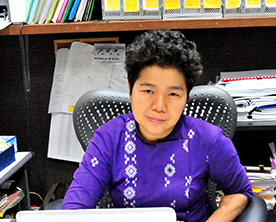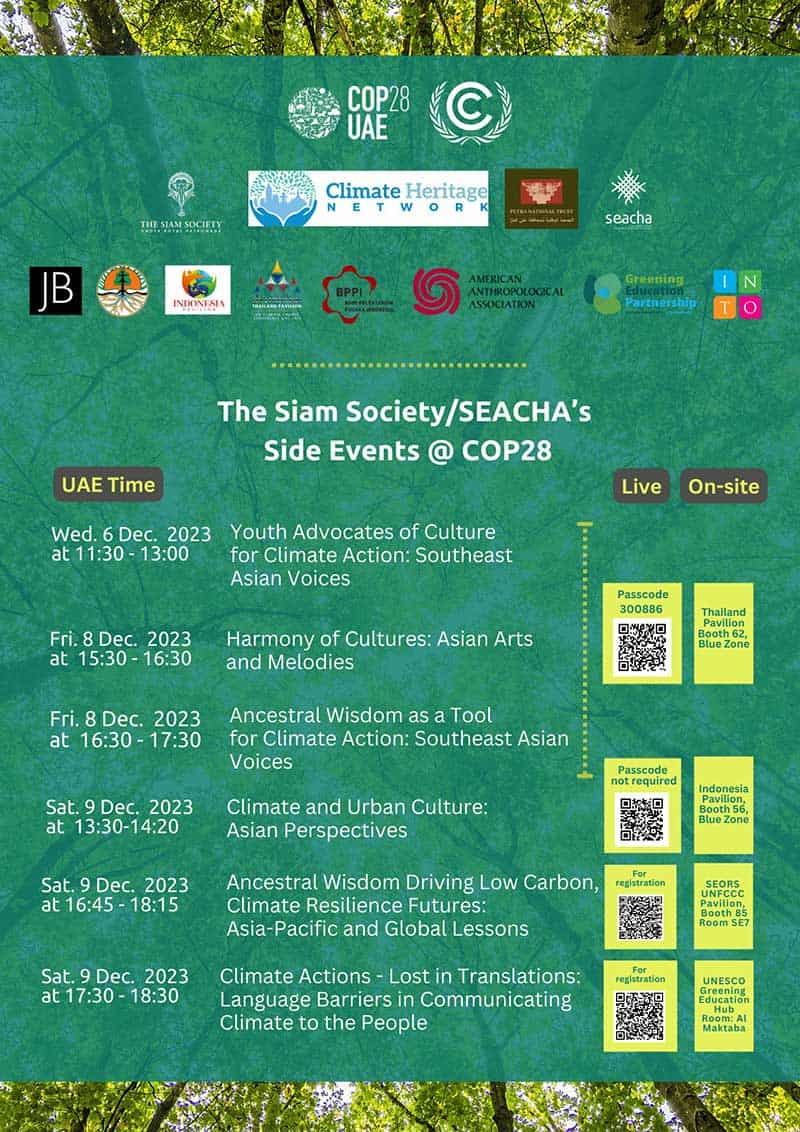Interview: Moe Moe Lwin, Vice Chairperson, SEACHA
Moe Moe Lwin, vice chairperson of SEACHA explains her work promoting Southeast Asian culture and practice in relation to climate change.

1. Tell us about SEACHA and the vision that established the organization
SEACHA is digital-based cultural alliance of non-state cultural heritage organizations from ASEAN member states. It was set up in 2019.
It aims to promote effective government-community partnership in cultural heritage management in Southeast Asia, to strengthen the ASEAN Socio-Cultural Community as a people-centered third pillar of ASEAN, and serve both as a networking forum between ASEAN member organizations, with an aim to be a dialogue partner of ASEAN governments and the ASEAN secretariat further.
2. Tell us about the members of SEACHA and what the organization does
SEACHA promotes Southeast Asian built heritage and cultural landscape, cultural wisdom, and practice in relation to climate change. All of its activities such as Cha-Time with SEACHA, Heritage Clinic, and conference reflect this.
Currently, we have 8 founding member organizations from 8 ASEAN nations except Cambodia and Brunei Darussalam. Indonesia Heritage Trust, Mulberries of Laos PDR, Penang Heritage Trust from Malaysia, Yangon Heritage Trust from Myanmar, The Heritage Conservation Society of the Philippines, Singapore Heritage Society, The Siam Society under Royal Patronage from Thailand, and Center for Research and Promotion of Cultural Heritage of Vietnam.
The secretariat is based in The Siam Society in Bangkok.
3. Tell us about the Yangon Heritage Trust and its Heritage Strategy for the city
Yangon Heritage Trust (YHT) was founded in 2012 to promote and protect Yangon’s unique urban heritage. Though its mission in the beginning was more emphasized to protect the city's built heritage environment from rising development waves, the Trust changed its vision to pay attention to wider city’s built, cultural, and natural heritage landscape in integrating with urban planning and design.
In 2016, before the democratically elected government was in power, YHT prepared ‘Yangon Heritage Strategy’ that contained 24 actionable projects to make Yangon more liveable while conserving its significant urban heritage landscape.
4. Tell us about how you personally got involved with SEACHA and the Yangon Heritage Trust
I was a practicing architect and General Secretary of the Association of Myanmar Architects when I joined the founding board of Yangon Heritage Trust in 2012.
I took the role of Director as a fulltime job soon after it was set up. In 2019, YHT joined SEACHA as a founding member organization together with other 7 fellow organizations, and I became one of the founding board members.
5. Tell us about SEACHA's joint working committee with The Siam Society for Culture@COP28 Initiative by CHN (Climate Heritage Network) together with the Petra National Trust from Jordan, focused on the Asia-Pacific Region
SEACHA organized a conference titled “Cultural Wisdom for Climate Action: Southeast Asia Contribution” in Bangkok in Jan 2023, that gave us an opportunity to be engaged with CHN in its initiatives for COP and to be co-chairing Culture@COP28 as this year's theme of the COP is Asia.
6. What are your six activities to voice Southeast Asian perspectives on how cultural wisdom can help us cope with climate change at COP28?

7. Tell us about the participants in these activities
I will be participating in 2 activities out of 6. Both will be on the 9th. One as a moderator for SEORS side event and one at the Indonesian Pavilion ‘Climate and Urban Culture.’
What is Your Reaction?
 Like
0
Like
0
 Dislike
0
Dislike
0
 Love
0
Love
0
 Funny
0
Funny
0
 Angry
0
Angry
0
 Sad
0
Sad
0
 Wow
0
Wow
0











































































